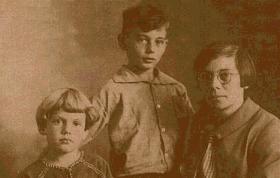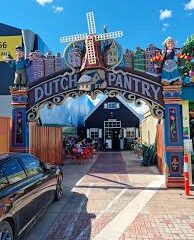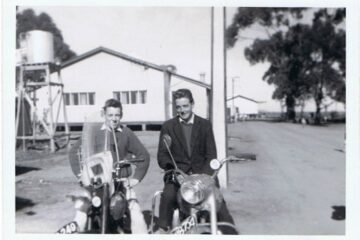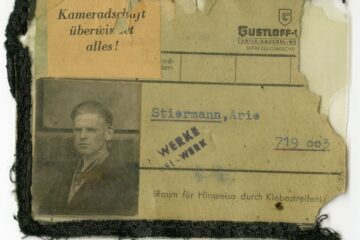Karel (1921-1999) en Gerard (1923-2006) van het Reve are two of the Netherlands most important post-WWII authors.

Their mother, Net Jannetta Jacoba Doornbusch (1892-1959), simply Net, came from Almelo. Her father Kornelis worked in the textile industry and had a small farm. There were ten siblings in the family, including a number who died at or shortly after birth. After the death of his wife Annegien in 1919 the father moved in with his daughter Net. He would remain with the family until shortly before his death in August 1941.
There is some confusion in Karel’s writing about the exact number of Net’s brothers and their fates. Karel wrote in his childhood memories about four brothers who emigrated to Australia, one of whom disappeared ‘without a trace’. In an exchange of letters from the 1980s with the family in Australia, he came to three brothers.
In a biography on Karel’s brother, written by Nop Maas it states that Net had four brothers, three of whom emigrated to Australia: Jan Luurt, Izaak and Berend. The fourth, brother Jan, was, according to Karel, a ‘failure’. According to Gerard, his mother came from a family of no fewer than thirteen children. This is one of his many mystifications, but he wasn’t so far wrong this time. There were ten in total, including a number who died at or shortly after birth.
Their father, Gerard Johannes Marinus van het Reve (1892-1975) had become a communist at an early age. He wrote under the name Vanter, which was more than a pseudonym, it became a second family name. Net and Gerad sr. met at a performance of the poet and socialist politician Herman Gorter hosted by the socially committed textiles manufacturer Jaap Bendien in Almelo
Gerard with at that stage his girlfriend Net had plans to emigrate to Australia, following Net’s brothers, but military service made departure impossible for the time being. Net worked as a nanny for the manufacturer Bendien. Bendien’s sister Selly left for Australia to get married there.
As a domestic servant, Net was able to get a free passage. In the summer of 1913, she left for Australia with the Bendien family and her brother Berend. Gerard would follow her as quickly as possible. He briefly considered desertion, but his future father-in-law did not think that was a good idea. In March 1914, Gerard resigned and worked hard to earn money for the passage to Australia. But in August the First World War broke out and he had to take up arms again. He would remain in military service until his retirement in March 1918. Because the war continued and Gerard was still in the army, Net decided to return to the Netherlands at the end of 1915. The British authorities gave her a special pass with which she travelled via England to the neutral Netherlands. She was back again in January 1916.
Karel wrote about his mother’s adventures in remote Australia: ‘She had been to Western Australia, in Perth and Fremantle, and had learned to speak excellent English’. Net and Gerad married in July 1916 and never concluded their plans to emigrate to Australia. They had two sons Karel and Gerard jr.
Main source: De Zelfdenker – Karel van het Reve
Berend Doornbusch
In 1919 Berend Doornbusch also returned to the Netherlands and stayed there with his sister and her newly wed husband. He toured around in Eastern Europe all the way to west Siberia. In 1927 he proposed to marry Hermina Langeler the daughter from the blacksmith in Lochem. A year later the couple migrated to Australia, this time Berend settled here permanently. They married in Perth, immediately after their arrival. They had a tough time in Australia, trying to make ends need with farming. They had six children and with two well educated parents, the children all received a university education and as such deliver four teachers and two engineers to the country.
This is an abstract from an article written by Alet Doornbush and published in A Touch of Dutch.


